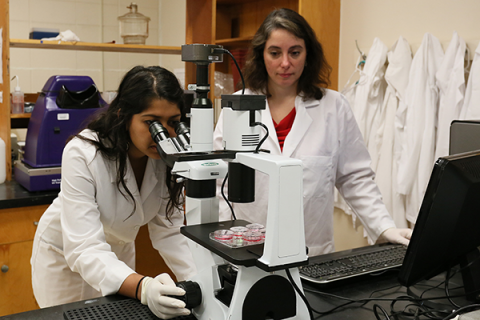Advanced Biology Degrees: Master's vs. Doctoral
You’re ready to go to grad school for biology. Congratulations! That’s a big decision, and you should be excited about expanding your educational horizons.
But now, the big question is ahead of you: Should I pursue a master’s in biology or my PhD in biology?
To find your answer, there are a lot of factors you need to consider—like where you see your career heading and the commitment you want to make to your education.
Where do you want to work?
Your professional goals are the biggest part of deciding whether you want a master’s or doctorate in biology.
If you see yourself in front of a college classroom, helping to nurture a passion for biology in your students, or leading a research team in labs and in the field, then you should consider getting a PhD in biology. Most PhD in biology programs are geared toward working in academia. A biology doctoral program will also prepare you for a research-centered career in biomedical and biotechnology industries, where you can lead your own research projects and contribute new, groundbreaking information to your field.
Master’s in biology programs may be a better choice if you’re looking to work in a field other than academia.
A master’s in biology is great preparation for working in industry and business, or if you want to pursue an additional professional degree in medicine, veterinary medicine, dentistry, or other applied fields.
How much time do you want to spend in school?
To be clear, earning any graduate degree is a significant time commitment that you shouldn’t begin unless you’re sure you can see it through.
Earning your master’s in biology takes about two years, depending on how many classes you take each semester and whether you do a thesis. If you decide to work while you’re going to school part time, the time it takes to complete your biology master’s program may extend to three or more years.
A PhD in biology requires a much longer commitment; for some, it can take as much as 4-6 years or longer. But don’t write off the value of those years! While you’re working on your PhD in biology, you’ll take classes, yes, but you’ll also lead your own research projects and complete a dissertation, which includes all of your original contributions to your field.
When deciding between a biology master’s program or PhD, you have to know if you have the passion and dedication to sustain an academic pursuit of 3 years or perhaps as long as 10 years.
Do you want to specialize in your field?
Do you have a really intense interest in a specific idea or question in biology or a specific animal or plant? How much effort do you want to devote to studying that one thing?
The potential to specialize in a specific area of biology corresponds directly with the type of advanced degree you earn. A PhD in biology program is designed to let you become hyper-specialized in your area of interest. Your research and dissertation revolve around that specialization, preparing you to be an expert by the time you graduate.
The master’s in biology curriculum is broader, and not as specialized—mostly because you’re not diving as deeply into your studies as you would in a PhD in biology program. You can still choose to have a specialization within the master’s in biology program, but it won’t be the entire focus of your studies.
Why not do both?
If you’re not sure if you’re ready for a PhD in biology program, but you’re ready to earn your graduate degree, you can treat a master’s in biology program as preparation for your PhD. In fact, in the history of our program, having a master’s degree in biology is the single best indicator of success for students in the doctoral program. Earning a master’s degree requires a shorter commitment, and will help you learn whether you’d like to go on for a doctoral degree and in which field.
The master’s in biology program at UL Lafayette has both a non-thesis option and a thesis option. The thesis option is research-based, and is a great way to help you decide if you’re ready to pursue your PhD in biology.
Find out more about the master's in biology ›
Find out more about the doctorate in biology ›
